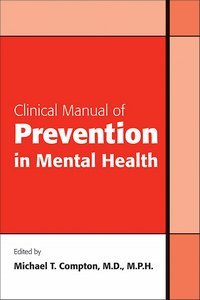Clinical Manual of Prevention in Mental Health
View Pricing
Description
According to David Satcher, M.D., Ph.D., the 16th U.S. Surgeon General, we know a great deal more about treating mental illnesses than about preventing them and promoting mental health. In his foreword to Clinical Manual of Prevention in Mental Health, Dr. Satcher applauds this guide as timely and vital, as it provides new and emerging research on the importance of prevention in mental health.
Clinical Manual of Prevention in Mental Health was conceived through discussions within the Prevention Committee of the Group for the Advancement of Psychiatry (GAP), and features contributions from 30 highly regarded clinicians and researchers who are experienced in the treatment and prevention of specific types of mental illnesses.
Clinical Manual of Prevention in Mental Health will help you move toward widespread adoption of mental illness prevention in your own practice setting. This important new reference provides practical suggestions to help you work toward preventing, or implementing preventive measures in the treatment of
- Mood disorders
- Anxiety disorders
- Schizophrenia
- Substance use disorders
- Suicidality
- Family violence
- Conduct disorder and other adolescent disorders
- Late-life depression, dementia, and mild cognitive impairment
- Physical illnesses in psychiatric settings
- Cigarette smoking
Compared with other areas of medicine, such as the prevention of infectious disease, our understanding of the prevention of mental illnesses remains in a relatively nascent state, especially in terms of how prevention can be incorporated into routine clinical practice. The authors of the various chapters have endeavored to balance reviewing the available research knowledge with providing guidance for practicing clinicians on how such knowledge can be incorporated into everyday practice.
Clinical Manual of Prevention in Mental Health urges clinicians everywhere to inquire about risk factors and protective factors in patients' lives in addition to focusing on the presenting problem. It is the authors' intent to provide mental health professionals with the knowledge and practical applications necessary to be prevention-minded in all of their interactions with patients, families, and the community.
Contents
- Contributors
- Foreword
- Preface
- Acknowledgements
- Chapter 1. Prevention in mental health: an introduction from the Prevention Committee of the Group for the Advancement of Psychiatry
- Chapter 2. Identifying and understanding risk factors and protective factors in clinical practice
- Chapter 3. Prevention of mood disorders
- Chapter 4. Prevention of anxiety disorders
- Chapter 5. Complementary and alternative medicine in the prevention of depression and anxiety
- Chapter 6. Applying prevention principles to schizophrenia and other psychotic disorders
- Chapter 7. Prevention of alcohol and drug abuse
- Chapter 8. Suicide prevention
- Chapter 9. Prevention of family violence
- Chapter 10. Prevention principles for adolescents in psychiatric practice: preventing conduct disorder and other behavioral problems
- Chapter 11. Prevention principles for older adults: preventing late-life depression, dementia, and mild cognitive impairment
- Chapter 12. Health promotion and prevention of somatic illnesses in psychiatric settings
- Chapter 13. Prevention of cigarette smoking: principles for psychiatric practice
- Index
Contributors
- Barbara Baumgardner, Ph.D., R.N.
O. Joseph Bienvenu, M.D., Ph.D.
Christina P.C. Borba, M.P.H.
Michael T. Compton, M.D., M.P.H.
Kathleen Connors, L.C.S.W.-C.
Lisa Dixon, M.D., M.P.H.
Benjamin G. Druss, M.D., M.P.H.
Paul R. Duberstein, Ph.D.
Kareem Ghalib, M.D.
Golda S. Ginsburg, Ph.D.
Michael F. Grunebaum, M.D.
Ann L. Hackman, M.D.
Gordon Harper, M.D.
Eric B. Hekler, Ph.D.
Laurel Kiser, Ph.D., M.B.A.
Carol Koplan, M.D.
Jeffrey M. Lyness, M.D.
Patricia Martens, Ph.D.
William M. McDonald, M.D.
Joanne A. McGriff, M.D., M.P.H.
Christopher Oleskey, M.D., M.P.H.
Ashli A. Owen-Smith, Ph.D.
Rebecca A. Powers, M.D., M.P.H.
David Pruitt, M.D.
Charles L. Raison, M.D.
Kenneth Rogers, M.D., M.S.H.S.
David Satcher, M.D., Ph.D.
Anne Shaffer, Ph.D.
Daniel J. Siegel
Laili Soleimani, M.Sc., M.D.
Larry Wissow, M.D., M.P.H.
Tuppett M. Yates, Ph.D.
About the Authors
Michael T. Compton, M.D., M.P.H., is an Assistant Professor in the Department of Psychiatry and Behavioral Sciences and Department of Family and Preventive Medicine at the Emory University School of Medicine; and an Assistant Professor in the Department of Behavioral Sciences and Health Education at the Rollins School of Public Health of Emory University in Atlanta, Georgia.
Related Products
Carousel Control - items will scroll by tabbing through them, otherwise arrows can be used to scroll one item at a time








